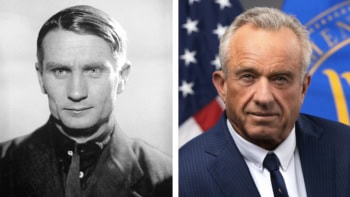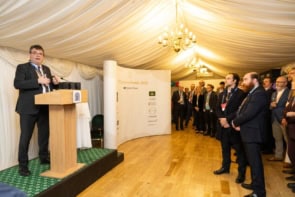The head of the UK’s biggest science funding agency has defended its controversial decision to restrict how often scientists can apply for grants from it. David Delpy, chief executive of the Engineering and Physical Sciences Research Council (EPSRC), says “there is no evidence” that the restriction has led to less creative grant applications or that it is penalizing young researchers.
Delpy was speaking in an exclusive video interview with Physics World, in which he also criticizes the UK government’s recent tightening of the rules on who can work and study in the country, saying it would “damage the UK’s standing in research”. Delpy, a medical physicist who has been EPSRC boss for almost four years, was last month reappointed by the UK science minister David Willetts until March 2014.
The EPSRC introduced its new restrictions in 2009 as a way of coping with the fact that the council was receiving so many more grant applications than it could afford to fund that in some disciplines up to 85% were getting rejected. The low success rate was also demoralizing for researchers, many of whom found that applications that had been rated highly by peer-review panels were nevertheless getting turned down. Delpy adds that the deluge of applications was even making it hard for the council to find enough referees to conduct the peer review.
Tightening up
As well as preventing researchers from resubmitting grants that have previously been turned down, the new rules now dictate that anyone with three rejected and below-par applications in any two-year period can make only one further application in the following year. “Having imposed this on the community, success rates have gone up to 30% because the number of applications has dropped [and] we are seeing an increase in the number of referee responses,” claims Delpy.
The EPSRC boss also denies that forcing applicants to explain the “impact” of their work in grant applications is hampering genuine breakthroughs. “We’re not asking academics to predict the full detailed outcome of their research,” insists Delpy. “What we’re saying is start thinking about how you would maximize the impact of that research, whether it’s within our discipline or in the form of policy advice to government or a product that could be marketed – [and to] ask in your application for the resources to do that.” Indeed, Delpy thinks that UK taxpayers have “the right” to know from scientists how the £800m that the EPSRC spends on research each year benefits the UK financially and socially.
“Unfair” changes
However, Philip Moriarty, a condensed-matter physicist from Nottingham University, thinks the EPSRC’s “blacklisting” rules are unfair. “I’m an ardent supporter of peer review but the idea that there’s a direct correlation between proposal quality and where it’s ranked on a panel prioritization list is nonsense,” he says. “If there are 40 grants for review by a panel, the top five and the bottom five will probably be relatively easy to define, but the remaining 30 in many cases may as well be ranked on the basis of throwing them up in the air and seeing where they land.”
Moriarty says he wants the EPSRC to run what he calls “a simple experiment” to test the council’s assumption that grants falling in the bottom half of a ranked list are necessarily of poor quality. “They should take the same set of proposals, send them out to different referees, and then give them to five different panels [and] look at the correlation in the ranked lists,” he says. “If they are so confident that the principle underlying the blacklisting process is robust, then why not do this experiment? It would silence me and all the other critics of the scheme.”
Looking for leaders
On the UK’s tightening of visa rules, which was heavily criticized for potentially stopping talented researchers from moving to the country, Delpy says he is “very pleased” that the government responded by making it easier for scientists with PhDs to meet the tougher requirements. But he warns that any barriers to the free movement of scientists is a bad idea. “Research is an internationally competitive game [and] if the UK wants to maintain its [leading] position any restriction of movement across international boundaries will work to the detriment of that – not just in physics but in all areas of research.”
Elsewhere in the interview, Delpy says the EPSRC will be encouraging young researchers with bright ideas by focusing over the next four years on “scientific leaders” who are either already running large teams or are prominent in their fields. “[We will] provide them with funding not just in the form of a one-off grant or fellowship but by providing funding across the whole of their research career – to provide mentorship and additional training in the additional skills that you need to be a research leaders and internationally competitive,” he says.
However, Moriarty regards the EPSRC’s decision to focus on “leaders” as “fundamentally flawed”. “In just what sense is focusing on leadership supporting new or young lecturers?” he asks. “One of the great aspects of the UK funding system for many years – and certainly something that kept me here when I had the opportunity to go back to Dublin in the boom years of Science Foundation Ireland – was the ability to establish an independent research career much more quickly than other places in Europe.”



